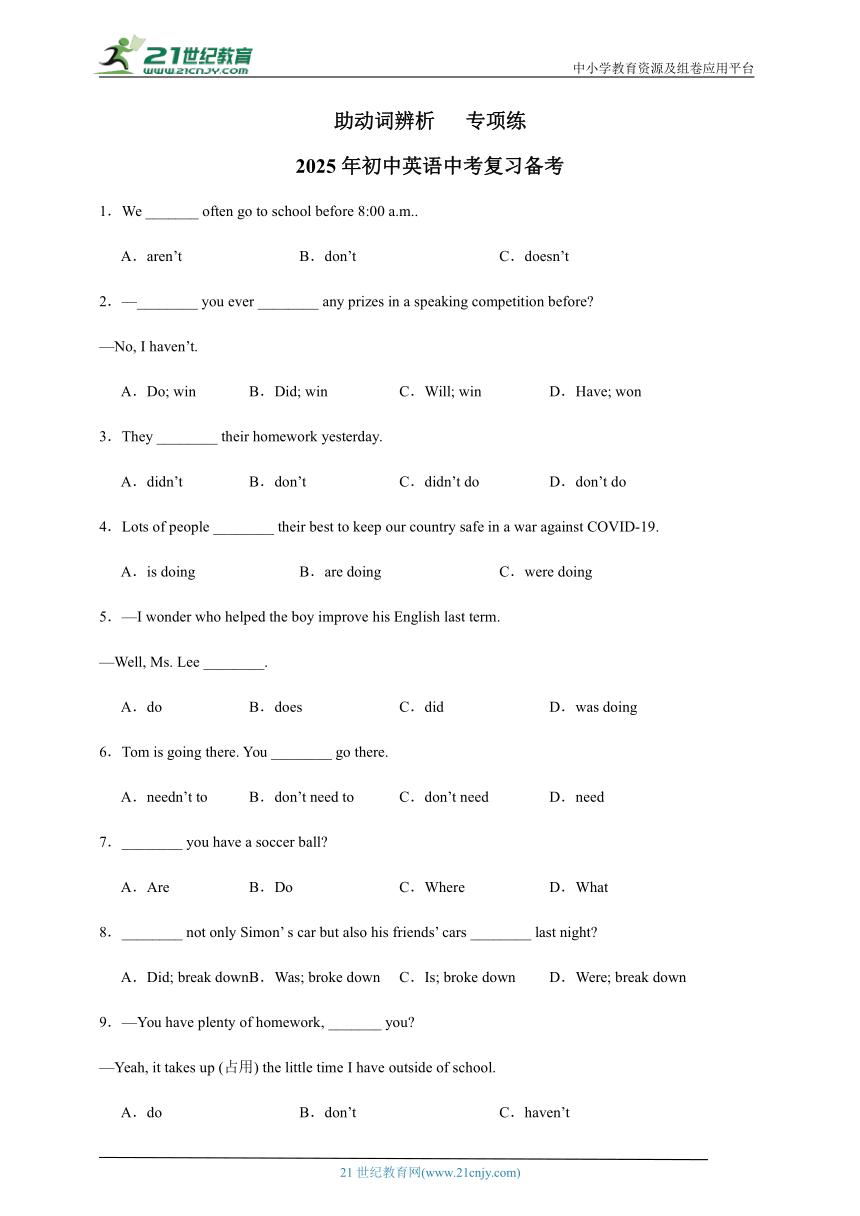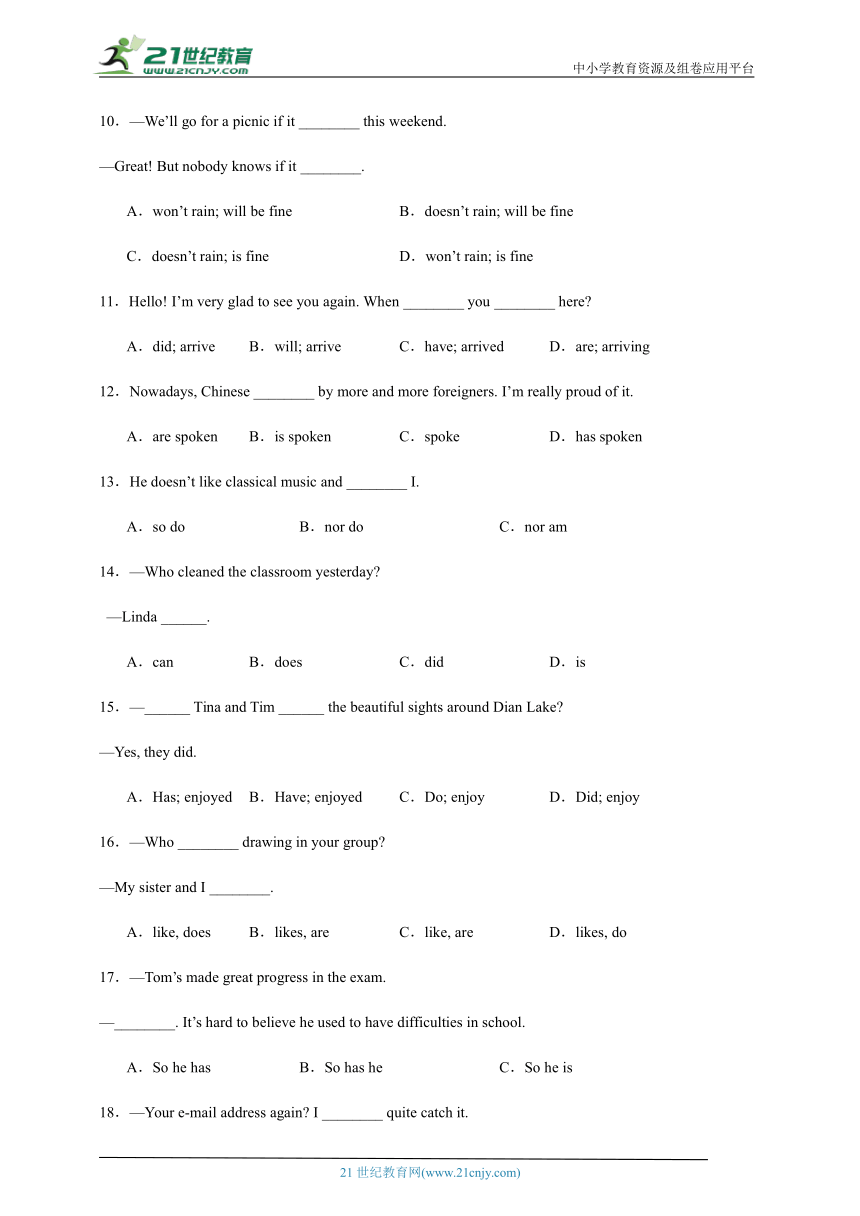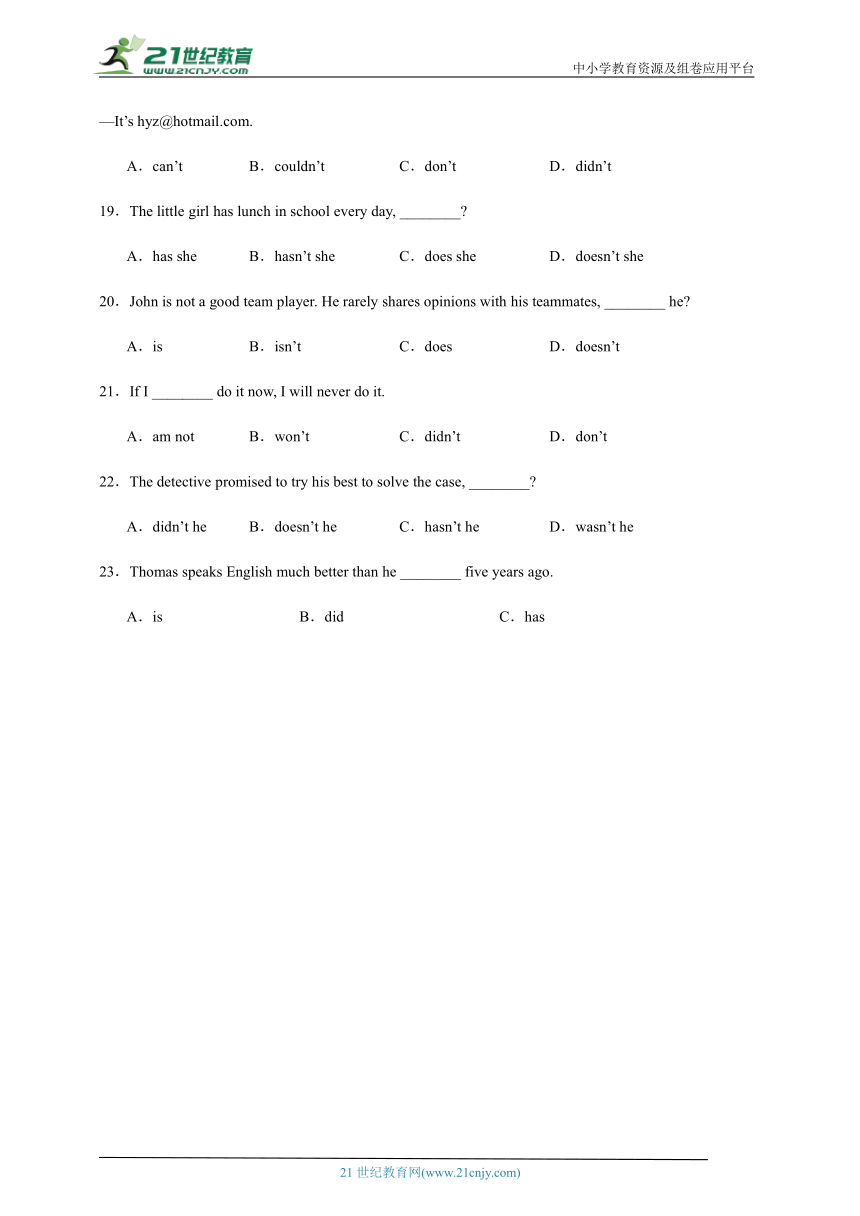助动词辨析 专项练 2025年初中英语中考复习备考
文档属性
| 名称 | 助动词辨析 专项练 2025年初中英语中考复习备考 |  | |
| 格式 | docx | ||
| 文件大小 | 44.6KB | ||
| 资源类型 | 试卷 | ||
| 版本资源 | 人教新目标(Go for it)版 | ||
| 科目 | 英语 | ||
| 更新时间 | 2024-11-11 15:42:28 | ||
图片预览



文档简介
中小学教育资源及组卷应用平台
助动词辨析 专项练
2025年初中英语中考复习备考
1.We _______ often go to school before 8:00 a.m..
A.aren’t B.don’t C.doesn’t
2.—________ you ever ________ any prizes in a speaking competition before
—No, I haven’t.
A.Do; win B.Did; win C.Will; win D.Have; won
3.They ________ their homework yesterday.
A.didn’t B.don’t C.didn’t do D.don’t do
4.Lots of people ________ their best to keep our country safe in a war against COVID-19.
A.is doing B.are doing C.were doing
5.—I wonder who helped the boy improve his English last term.
—Well, Ms. Lee ________.
A.do B.does C.did D.was doing
6.Tom is going there. You ________ go there.
A.needn’t to B.don’t need to C.don’t need D.need
7.________ you have a soccer ball
A.Are B.Do C.Where D.What
8.________ not only Simon’ s car but also his friends’ cars ________ last night
A.Did; break down B.Was; broke down C.Is; broke down D.Were; break down
9.—You have plenty of homework, _______ you
—Yeah, it takes up (占用) the little time I have outside of school.
A.do B.don’t C.haven’t
10.—We’ll go for a picnic if it ________ this weekend.
—Great! But nobody knows if it ________.
A.won’t rain; will be fine B.doesn’t rain; will be fine
C.doesn’t rain; is fine D.won’t rain; is fine
11.Hello! I’m very glad to see you again. When ________ you ________ here
A.did; arrive B.will; arrive C.have; arrived D.are; arriving
12.Nowadays, Chinese ________ by more and more foreigners. I’m really proud of it.
A.are spoken B.is spoken C.spoke D.has spoken
13.He doesn’t like classical music and ________ I.
A.so do B.nor do C.nor am
14.—Who cleaned the classroom yesterday
—Linda ______.
A.can B.does C.did D.is
15.—______ Tina and Tim ______ the beautiful sights around Dian Lake
—Yes, they did.
A.Has; enjoyed B.Have; enjoyed C.Do; enjoy D.Did; enjoy
16.—Who ________ drawing in your group
—My sister and I ________.
A.like, does B.likes, are C.like, are D.likes, do
17.—Tom’s made great progress in the exam.
—________. It’s hard to believe he used to have difficulties in school.
A.So he has B.So has he C.So he is
18.—Your e-mail address again I ________ quite catch it.
—It’s hyz@.
A.can’t B.couldn’t C.don’t D.didn’t
19.The little girl has lunch in school every day, ________
A.has she B.hasn’t she C.does she D.doesn’t she
20.John is not a good team player. He rarely shares opinions with his teammates, ________ he
A.is B.isn’t C.does D.doesn’t
21.If I ________ do it now, I will never do it.
A.am not B.won’t C.didn’t D.don’t
22.The detective promised to try his best to solve the case, ________
A.didn’t he B.doesn’t he C.hasn’t he D.wasn’t he
23.Thomas speaks English much better than he ________ five years ago.
A.is B.did C.has
参考答案:
1.B
考查否定句。根据“often”可知,句子是一般现在时,句中有动词go,此处否定应用助动词构成,主语是we,助动词用don’t,故选B。
2.D
考查一般疑问句。根据答语“No, I haven’t.”可知,本句是现在完成时,用助动词have提问,谓语动词用过去分词,故选D。
3.C
考查一般过去时态。根据“yesterday”可知是一般过去时态,句子谓语动词为实意动词do,否定句借助助动词do的变形didn’t,助动词后加实意动词原形。故选C。
4.B
考查动词时态。根据主语“lots of people”可知,主语为复数名词,助动词应为复数,排除A;根据语境可知,抗击病毒的动作正在进行中,应用现在进行时,排除C。故选B。
5.C
考查一般过去时态。根据“who helped the boy...”可知,答语用一般过去时。故选C。
6.B
考查need的用法。need需要,作为情态动词后跟动词原形,作为实义动词后跟动词不定式。根据“Tom is going there. You …go there.”可知,此处表示否定,即不需要去,使用needn’t或者don’t need to。故选B。
7.B
考查一般疑问句。疑问句的谓语动词为have,一般疑问句要用助动词,结合“you”可知,应该使用助动词do。故选B。
8.A
考查助动词的用法和一般过去时的一般疑问句。did做,干,办某事,助动词(do的过去式);break down(机器或车辆)发生故障,出毛病,break的过去式为broke;is 是,be动词的第三人称单数现在时形式;was是,be的第一和第三人称单数过去式;were是,be的过去时复数和第二人称单数形式;break down是实义动词短语,根据时间状语“last night”可知,句子应是一般过去时,动词是实义动词,故疑问句的助动词应是did,同时句子变疑问,动词要恢复原形。故选A。
9.B
考查反义疑问句。反义疑问句的结构为“陈述句+简略疑问句”,遵循“前肯后否,前否后肯”的原则。这里的have是实义动词,意为“有”,所以应用助动词提问;前半部分是肯定形式,因此用助动词don’t。故选B。
10.B
考查if的用法。第一个句子中的if“如果”引导条件状语从句,遵循“主将从现”的原则,所以第一空应用一般现在时,主语it是第三人称单数,所以使用助动词does加动词原形构成否定形式;第二句中的if“是否”,引导宾语从句,从句应用一般将来时,表示“不知将来是否会下雨”,其结构为“will+do”,故选B。
11.A
考查动词时态。根据“I’m very glad to see you again”可知,已经见到了对方,说对方到达这个动作发生在过去,应用一般过去时,疑问句借助于助动词did,故选A。
12.B
考查被动语态和主谓一致。此处“Chinese”表示“汉语,中文”,与speak“说”是被动关系,根据“Nowadays”可知,用一般现在时的被动语态am/is/are+done,排除C和D;“Chinese”是第三人称单数,be动词用is。故选B。
13.B
考查倒装句。根据“He doesn’t like classical music and...I”可知此处表示“我也不喜欢”,用倒装句结构“nor+助动词/情态动词/be动词+主语”,根据“doesn’t like...”可知此处借助助动词do。 14.C
考查动词辨析。can能够;does做,do的第三人称单数形式;did做,do的过去式;is是。根据“Who cleaned the classroom yesterday ”可知,句中时态为一般过去时,为了避免重复,此处使用did代替cleaned the classroom。故选C。
15.D
考查时态。根据“Yes, they did”可知句子用一般过去时,变疑问句时借助助动词did,后加动词原形。故选D。
16.D
考查主谓一致。根据“Who”可知,Who作主语,此处谓语动词使用三单形式,排除A、C。第二空为了避免重复,用助动词do代替上一句的like,故选D。
17.A
考查倒装句。根据“It’s hard to believe he used to have difficulties in school.”可知,回答者是表示赞同,应用“so+主语+助动词/情态动词/be动词”来表示;根据“Tom’s made”可知,助动词为has,用代词he“他”代替Tom,故横线处为So he has,表示“的确如此”。故选A。
18.D
hyz@。
考查情态动词。can’t不能;couldn’t不能,过去式;don’t没有;didn’t没有,过去式。根据“Your e-mail address again ”可知是刚才没有跟上,故此处表示过去的动作,变否定句借助助动词didn’t。故选D。
19.D
考查反意疑问句。反意疑问句遵循“前肯后否,前否后肯”的原则。分析句子可知陈述部分是肯定句,且句子时态是一般现在时,助动词用does,反意疑问句要用否定形式。故选D。
20.C
考查反意疑问句。反意疑问句遵循前肯后否,前否后肯,陈述部分中含有否定意义的词rarely,故疑问部分用肯定,根据“shares...”可知疑问部分借助助动词does。
21.D
考查时态及助动词。“do”是实义动词,此处不用be动词;if引导的条件状语从句,遵循主将从现原则,此处用一般现在时,助动词用don’t。
22.A
考查反意疑问句。根据“promised”可知此处是一般过去时,反问部分用“didn’t he”。
23.B
考查谓语动词的时态。than引导比较状语从句,根据“five years ago”可知,从句用一般过去时,空处填did,指的是“spoke English”。
21世纪教育网 www.21cnjy.com 精品试卷·第 2 页 (共 2 页)
21世纪教育网(www.21cnjy.com)
助动词辨析 专项练
2025年初中英语中考复习备考
1.We _______ often go to school before 8:00 a.m..
A.aren’t B.don’t C.doesn’t
2.—________ you ever ________ any prizes in a speaking competition before
—No, I haven’t.
A.Do; win B.Did; win C.Will; win D.Have; won
3.They ________ their homework yesterday.
A.didn’t B.don’t C.didn’t do D.don’t do
4.Lots of people ________ their best to keep our country safe in a war against COVID-19.
A.is doing B.are doing C.were doing
5.—I wonder who helped the boy improve his English last term.
—Well, Ms. Lee ________.
A.do B.does C.did D.was doing
6.Tom is going there. You ________ go there.
A.needn’t to B.don’t need to C.don’t need D.need
7.________ you have a soccer ball
A.Are B.Do C.Where D.What
8.________ not only Simon’ s car but also his friends’ cars ________ last night
A.Did; break down B.Was; broke down C.Is; broke down D.Were; break down
9.—You have plenty of homework, _______ you
—Yeah, it takes up (占用) the little time I have outside of school.
A.do B.don’t C.haven’t
10.—We’ll go for a picnic if it ________ this weekend.
—Great! But nobody knows if it ________.
A.won’t rain; will be fine B.doesn’t rain; will be fine
C.doesn’t rain; is fine D.won’t rain; is fine
11.Hello! I’m very glad to see you again. When ________ you ________ here
A.did; arrive B.will; arrive C.have; arrived D.are; arriving
12.Nowadays, Chinese ________ by more and more foreigners. I’m really proud of it.
A.are spoken B.is spoken C.spoke D.has spoken
13.He doesn’t like classical music and ________ I.
A.so do B.nor do C.nor am
14.—Who cleaned the classroom yesterday
—Linda ______.
A.can B.does C.did D.is
15.—______ Tina and Tim ______ the beautiful sights around Dian Lake
—Yes, they did.
A.Has; enjoyed B.Have; enjoyed C.Do; enjoy D.Did; enjoy
16.—Who ________ drawing in your group
—My sister and I ________.
A.like, does B.likes, are C.like, are D.likes, do
17.—Tom’s made great progress in the exam.
—________. It’s hard to believe he used to have difficulties in school.
A.So he has B.So has he C.So he is
18.—Your e-mail address again I ________ quite catch it.
—It’s hyz@.
A.can’t B.couldn’t C.don’t D.didn’t
19.The little girl has lunch in school every day, ________
A.has she B.hasn’t she C.does she D.doesn’t she
20.John is not a good team player. He rarely shares opinions with his teammates, ________ he
A.is B.isn’t C.does D.doesn’t
21.If I ________ do it now, I will never do it.
A.am not B.won’t C.didn’t D.don’t
22.The detective promised to try his best to solve the case, ________
A.didn’t he B.doesn’t he C.hasn’t he D.wasn’t he
23.Thomas speaks English much better than he ________ five years ago.
A.is B.did C.has
参考答案:
1.B
考查否定句。根据“often”可知,句子是一般现在时,句中有动词go,此处否定应用助动词构成,主语是we,助动词用don’t,故选B。
2.D
考查一般疑问句。根据答语“No, I haven’t.”可知,本句是现在完成时,用助动词have提问,谓语动词用过去分词,故选D。
3.C
考查一般过去时态。根据“yesterday”可知是一般过去时态,句子谓语动词为实意动词do,否定句借助助动词do的变形didn’t,助动词后加实意动词原形。故选C。
4.B
考查动词时态。根据主语“lots of people”可知,主语为复数名词,助动词应为复数,排除A;根据语境可知,抗击病毒的动作正在进行中,应用现在进行时,排除C。故选B。
5.C
考查一般过去时态。根据“who helped the boy...”可知,答语用一般过去时。故选C。
6.B
考查need的用法。need需要,作为情态动词后跟动词原形,作为实义动词后跟动词不定式。根据“Tom is going there. You …go there.”可知,此处表示否定,即不需要去,使用needn’t或者don’t need to。故选B。
7.B
考查一般疑问句。疑问句的谓语动词为have,一般疑问句要用助动词,结合“you”可知,应该使用助动词do。故选B。
8.A
考查助动词的用法和一般过去时的一般疑问句。did做,干,办某事,助动词(do的过去式);break down(机器或车辆)发生故障,出毛病,break的过去式为broke;is 是,be动词的第三人称单数现在时形式;was是,be的第一和第三人称单数过去式;were是,be的过去时复数和第二人称单数形式;break down是实义动词短语,根据时间状语“last night”可知,句子应是一般过去时,动词是实义动词,故疑问句的助动词应是did,同时句子变疑问,动词要恢复原形。故选A。
9.B
考查反义疑问句。反义疑问句的结构为“陈述句+简略疑问句”,遵循“前肯后否,前否后肯”的原则。这里的have是实义动词,意为“有”,所以应用助动词提问;前半部分是肯定形式,因此用助动词don’t。故选B。
10.B
考查if的用法。第一个句子中的if“如果”引导条件状语从句,遵循“主将从现”的原则,所以第一空应用一般现在时,主语it是第三人称单数,所以使用助动词does加动词原形构成否定形式;第二句中的if“是否”,引导宾语从句,从句应用一般将来时,表示“不知将来是否会下雨”,其结构为“will+do”,故选B。
11.A
考查动词时态。根据“I’m very glad to see you again”可知,已经见到了对方,说对方到达这个动作发生在过去,应用一般过去时,疑问句借助于助动词did,故选A。
12.B
考查被动语态和主谓一致。此处“Chinese”表示“汉语,中文”,与speak“说”是被动关系,根据“Nowadays”可知,用一般现在时的被动语态am/is/are+done,排除C和D;“Chinese”是第三人称单数,be动词用is。故选B。
13.B
考查倒装句。根据“He doesn’t like classical music and...I”可知此处表示“我也不喜欢”,用倒装句结构“nor+助动词/情态动词/be动词+主语”,根据“doesn’t like...”可知此处借助助动词do。 14.C
考查动词辨析。can能够;does做,do的第三人称单数形式;did做,do的过去式;is是。根据“Who cleaned the classroom yesterday ”可知,句中时态为一般过去时,为了避免重复,此处使用did代替cleaned the classroom。故选C。
15.D
考查时态。根据“Yes, they did”可知句子用一般过去时,变疑问句时借助助动词did,后加动词原形。故选D。
16.D
考查主谓一致。根据“Who”可知,Who作主语,此处谓语动词使用三单形式,排除A、C。第二空为了避免重复,用助动词do代替上一句的like,故选D。
17.A
考查倒装句。根据“It’s hard to believe he used to have difficulties in school.”可知,回答者是表示赞同,应用“so+主语+助动词/情态动词/be动词”来表示;根据“Tom’s made”可知,助动词为has,用代词he“他”代替Tom,故横线处为So he has,表示“的确如此”。故选A。
18.D
hyz@。
考查情态动词。can’t不能;couldn’t不能,过去式;don’t没有;didn’t没有,过去式。根据“Your e-mail address again ”可知是刚才没有跟上,故此处表示过去的动作,变否定句借助助动词didn’t。故选D。
19.D
考查反意疑问句。反意疑问句遵循“前肯后否,前否后肯”的原则。分析句子可知陈述部分是肯定句,且句子时态是一般现在时,助动词用does,反意疑问句要用否定形式。故选D。
20.C
考查反意疑问句。反意疑问句遵循前肯后否,前否后肯,陈述部分中含有否定意义的词rarely,故疑问部分用肯定,根据“shares...”可知疑问部分借助助动词does。
21.D
考查时态及助动词。“do”是实义动词,此处不用be动词;if引导的条件状语从句,遵循主将从现原则,此处用一般现在时,助动词用don’t。
22.A
考查反意疑问句。根据“promised”可知此处是一般过去时,反问部分用“didn’t he”。
23.B
考查谓语动词的时态。than引导比较状语从句,根据“five years ago”可知,从句用一般过去时,空处填did,指的是“spoke English”。
21世纪教育网 www.21cnjy.com 精品试卷·第 2 页 (共 2 页)
21世纪教育网(www.21cnjy.com)
